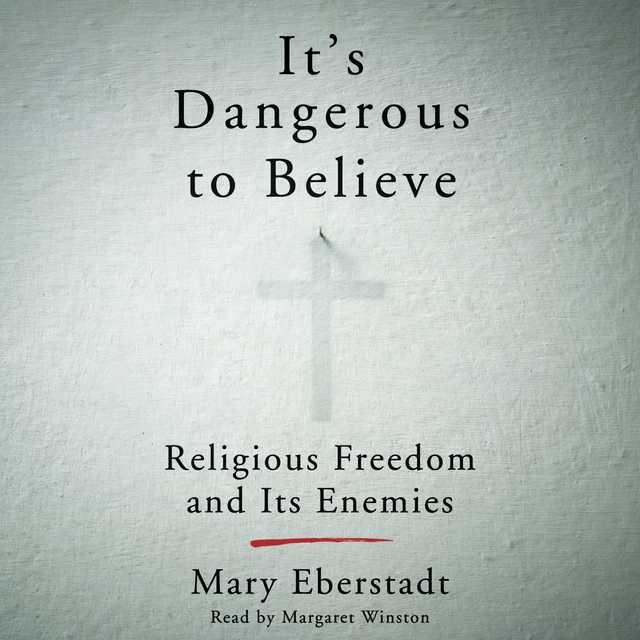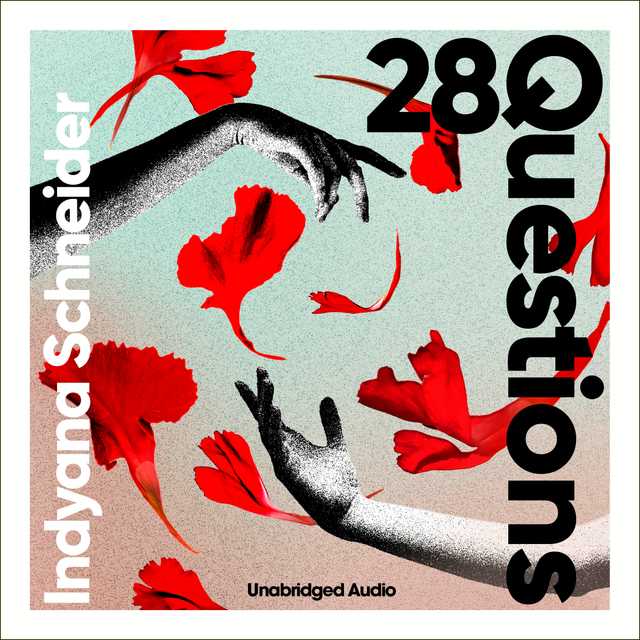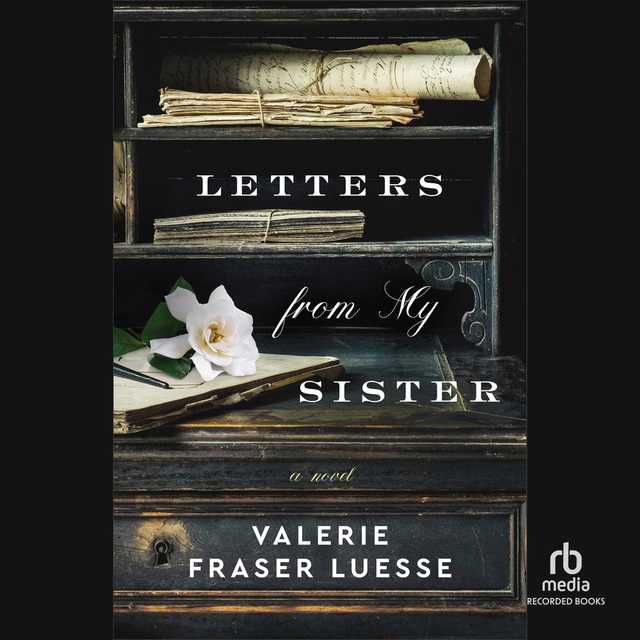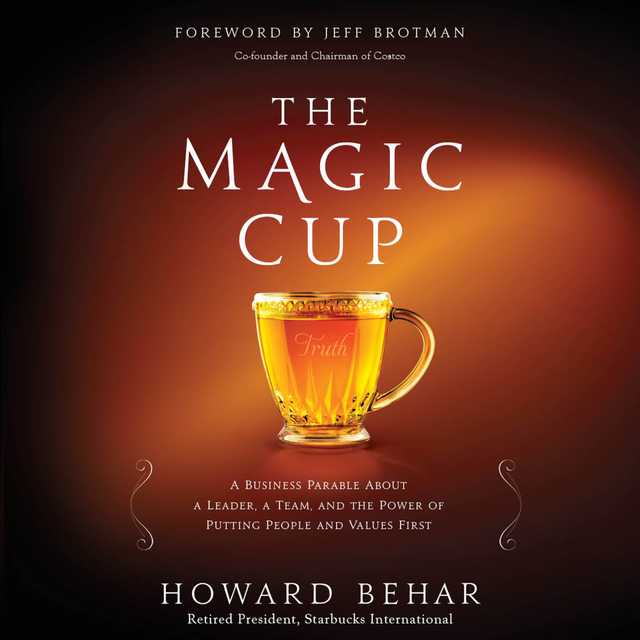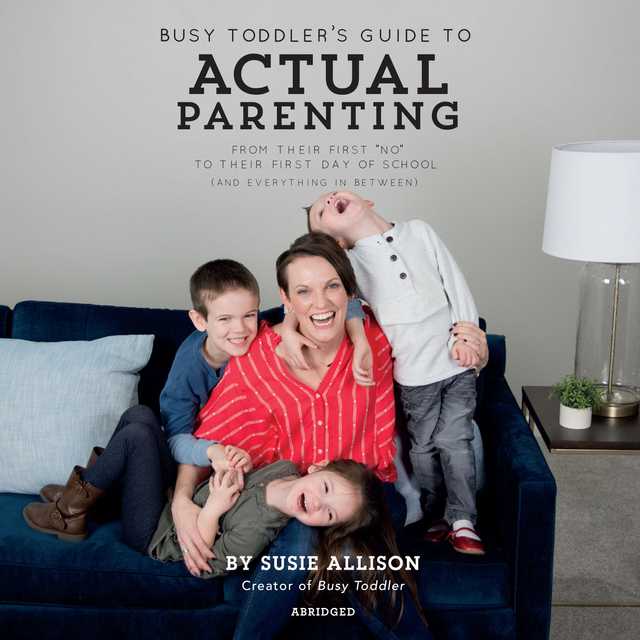It’s Dangerous to Believe Audiobook Summary
Mary Eberstadt, “one of the most acute and creative social observers of our time,” (Francis Fukuyama) shines a much-needed spotlight on a disturbing trend in American society: discrimination against traditional religious belief and believers, who are being aggressively pushed out of public life by the concerted efforts of militant secularists.
In It’s Dangerous to Believe, Mary Eberstadt documents how people of faith–especially Christians who adhere to traditional religious beliefs–face widespread discrimination in today’s increasingly secular society. Eberstadt details how recent laws, court decisions, and intimidation on campuses and elsewhere threaten believers who fear losing their jobs, their communities, and their basic freedoms solely because of their convictions. They fear that their religious universities and colleges will capitulate to aggressive secularist demands. They fear that they and their families will be ostracized or will have to lose their religion because of mounting social and financial penalties for believing. They fear they won’t be able to maintain charitable operations that help the sick and feed the hungry.
Is this what we want for our country?
Religious freedom is a fundamental right, enshrined in the First Amendment. With It’s Dangerous to Believe Eberstadt calls attention to this growing bigotry and seeks to open the minds of secular liberals whose otherwise good intentions are transforming them into modern inquisitors. Not until these progressives live up to their own standards of tolerance and diversity, she reminds us, can we build the inclusive society America was meant to be.
Other Top Audiobooks
It’s Dangerous to Believe Audiobook Narrator
Margaret Winston is the narrator of It’s Dangerous to Believe audiobook that was written by Mary Eberstadt
Mary Eberstadt is an essayist, novelist, and author of several influential works of non-fiction, including How the West Really Lost God: A New Theory of Secularization; Adam and Eve after the Pill: Paradoxes of the Sexual Revolution; and Home-Alone America. Her novel The Loser Letters: A Comic Tale of Life, Death, and Atheism, has been adapted for stage and will premiere in fall 2016. She is also editor of the anthology Why I Turned Right: Leading Baby Boom Conservatives Chronicle Their Political Journeys.
A frequent contributor to magazines and journals including TIME, the Wall Street Journal, National Review, the Weekly Standard, and First Things, Mrs. Eberstadt (nee Tedeschi) has also served as an editor at The Public Interest, The National Interest, and Policy Review. She has been associated with various think tanks, including most recently the Hoover Institution and the Ethics and Public Policy Center. In 2011, she founded a literary organization called the Kirkpatrick Society that has mentored hundreds of writers.
During the Reagan administration, Mrs. Eberstadt spent two years as a speechwriter to Secretary of State George Shultz.. She graduated magna cum laude from Cornell University with a double major in philosophy and government. She lives in the Washington, DC area.
About the Author(s) of It’s Dangerous to Believe
Mary Eberstadt is the author of It’s Dangerous to Believe
More From the Same
- Author : Mary Eberstadt
- How the West Really Lost God
- Publisher : HarperAudio
- Abraham
- American Gods [TV Tie-In]
- Dead Ringer
- House of Sand and Fog
- Prey
It’s Dangerous to Believe Full Details
| Narrator | Margaret Winston |
| Length | 5 hours 20 minutes |
| Author | Mary Eberstadt |
| Category | |
| Publisher | HarperAudio |
| Release date | June 21, 2016 |
| ISBN | 9780062471970 |
Subjects
The publisher of the It’s Dangerous to Believe is HarperAudio. includes the following subjects: The BISAC Subject Code is Philosophy, Religion
Additional info
The publisher of the It’s Dangerous to Believe is HarperAudio. The imprint is HarperAudio. It is supplied by HarperAudio. The ISBN-13 is 9780062471970.
Global Availability
This book is only available in the United States.
Goodreads Reviews
Peter
June 25, 2016
Please give me a helpful vote on Amazon - http://www.amazon.com/review/R1UKGYBO...Mary Eberstadt is a first-rate writer with keen insight and an ability to clearly communicate the facts underlying the issue she is addressing. Her classic article in First Things (November, 2009) on how the Catholic sex-abuse scandal retarded the growing acceptance of pedophilia in American culture - "How Pedophilia Lost its Cool" - is a prime example of seeing a major point that everyone else has missed in the morass of facts and following up on the insight with something that everyone else has missed and following up on that insight with a merciless attention to those facts.In this book, Eberstadt examines the modern "Kulturkampf." She canvasses the news of the last few years - often times including vignettes from a few months ago, albeit because of the publication date she barely missed the sorry proof of her thesis of the last few weeks, during which Christians have been paradoxically blamed for the mass murder of gays committed by a Muslim terrorist, registered as a Democrat, who may have been gay, if early news reports are accurate. Eberstadt provides example after example of the cultural shift in rhetoric and conduct that has resulted in Christians being shunned or treated as subversives in America. She provides examples of believing Christians being kept out of university programs because of their Christian culture and of careers destroyed because of Christian expression and of individual and public discrimination against Christians and their association because of their religion. She points out that these same examples would have been unthinkable if the word "Christian" was replaced by "gay" or "Muslim."Eberstadt properly calls this "soft persecution" - as opposed to the "hard persecution" suffered by Christians in the Mid-east. However, "soft persecution" is a big deal. Most of the history of persecution involves "soft persecution." Catholics in England were persecuted "softly" by having taxes imposed on them when they didn't go to the Church of England. Islam has moved generations of Christians into Islam by treating Christians as dhimmis. Soft persecution works.Eberstadt's unifying thesis for this cultural shift is that the sexual revolution has created a new "faith" with its own dogmas and doctrines. Members of the new faith may not recognize themselves as having a faith, but their conduct - harsh, shrill, threatened, looking for heretics, excommunicating offenders, ritualized shaming - are recognizable as the actions of people who are defending a faith commitment rather than a public policy. I think that Eberstadt made her case in this regard. I had not looked at this issue in this way before, but it has an explanatory power for the insanely threatened and emotional reactions I've observed when I get into Facebook debates with secularists, who escalate to name-calling in zero time.For those of us who are still trying to occupy the public square, and defend traditional Christian values, and, perhaps, shame secularists for the hypocrisy and cognitive dissonance that their position entails, Eberstadt's book is a great resource. In the wake of the 2016 Orlando Muslim terrorist attack, secular atheists have unearthed videos of one or two hyperliteralist fundamentalist Protestant pastors who preach sermons that refer to the victims as sodomites who deserve to be dead. This is certainly uncharitable and ugly speech, but it remains speech, and speech totally unrelated to the mass murder. Nonetheless, secularists are cheering that Paypal has eliminated the hyperliteralists accounts and the landlord has evicted them. In response to this, my questions about the traditional liberal value of defending the rights of people to engage in speech, when all they are doing is engaging in speech, is met with the "explanation" that bigots don't deserve rights.This is a discussion that I am having today.It is the Eberstadt book in a microcosm.In response I have quoted this from the Eberstadt book:"In August 2012, a gunman entered the office building in downtown Washington, D.C., that houses the Family Research Council (FRC), a Christian organization dedicated to traditional moral teaching. By his own account, available on video, he was alerted by secular progressive “watchdog” groups, including the Southern Poverty Law Center, that painted the FRC as a “hate group.” The shooter explained that this made him intend to kill as many of its members as he could, as he later told the FBI. 1 In the event, he fired at and hit a security guard, who disarmed him before his dream of mass murder could be fulfilled."Eberstadt, Mary. It's Dangerous to Believe: Religious Freedom and Its Enemies (Kindle Locations 1361-1366). HarperCollins. Kindle Edition. I have asked whether - in light of the principle they are espousing with respect to the hyperliteralists - they would support similar treatment to the SPLC.I have received no answer except some assertions that I must be politically aligned with the hyperliteralist Protestant pastor nutjob.One of the interesting things, however, is that while the SPLC "incitement" - I don't think the SPLC "incited" this shooter anymore than any other shooter was "incited" by political speech - is a great case for getting secularists to think about whether they always hold the moral high-ground, I would have forgotten it if I hadn't just read it in the Eberstadt book. Why is that? Is it because the narrative of our age pays more attention to "rightwing violence" than "leftwing violence," so that this example required a special effort to remember before it was sent to the "memory hole"?A nit that I will pick with Eberstadt is that in her fairly encyclopedic listing of outrageous smears against Catholics, she forgot to mention how the San Francisco City Council passed a resolution declaring the Catholic Bishop of San Francisco to be subversive of San Francisco's values of tolerance and diversity because he shut down the Catholic adoption program rather than violate Catholic teachings about placing children in the households of homosexual couples. This decision was actually upheld by the Ninth Circuit. It would have seemed to be a great example to add to her list, but, again, this news story, which would have been national news if it had been done to a Muslim in Texas, never got news attention, and has slipped down the memory hole.Weird, that.I found her conclusion to be the weakest part of her book. Eberstadt looks at the history of hysteria and notes that hysteria dies down when the hysterics have had enough. She therefore calls on the secularists to stop using terms like "hater" and "bigot" and to return to the values of respecting the rights of others to speak as a safeguard for them when their ideas fall out of favor.OK...maybe....but I think that this is different. The previous examples occurred in Christian cultures, which had values like "do unto others" and "the Good Samaritan" and "shame" and an adherence to neutral principles and logic. Is it the case that this new civilization - Post-Christian, and what I call Civilization 3.0 - has those values? The evidence suggests that this is not the case. My experience with individualists suggests that this is not the case: they are absolutely unembarrassed to tell me that discrimination only occurs when their sacred cows are offended, and they seem unable to understand that their bete noirs can ever be discriminated against.I am currently reading [[ASIN:162157296X Witness (Cold War Classics)]], which has caused me to reflect that Eberstadt's description of where we are could be a straight line projection of what Chambers was describing as where the Communist party was in the 1920s and 1930s, including "Communist marriage" - which was based on the agreement of the parties to act as if they were married - and the double-think and the definition of justice as "what is good for our side." I think that those values have largely won through their incorporation into the sexual revolution. If that is the case, an appeal to the better angels of secularist nature is not going to be effective.What should be done? Keep pitching. Point out the hypocrisy and inconsistencies of secularists engaged in "soft persecution." It may not make you loved, but Christians have been promised a return for beating hated and vilified "for my name's sake."
Jonathan
July 06, 2017
This slim book by Mary Eberstadt tackles, with characteristic passion, one of the great but often-ignored topics of our time: the increasing hostility within Western society for traditional religious believers. As a pastor, I consider myself fairly tuned in to this sort of news, but Eberstadt found some shocking examples that even I'd managed to miss. Eberstadt repeatedly inquires what we would think if another religious (or irreligious) group were being culturally marginalized and legally targeted in this manner - we would, of course, rightly find it abhorrent. Eberstadt is persuasive in contending that the current furor over respecting the right of traditional religious persons and groups to conduct their lives in accordance with their own convictions, has the structure of a moral panic - much like the Salem witch craze, the Red Scare, and the daycare sex-abuse hysteria a few decades ago. In the case of those moral panics, the targeted group could really do nothing to change what was happening; it required the general public to end the hysteria. The same, Eberstadt argues, is true here, and so she makes an appeal to Western liberals to reject the hysteria and recover historic liberal values.
Miles
February 05, 2017
This is a great book that deserves a wide readership. Eberstadt lays out an fast and comprehensive exploration of the myriad ways in which orthodox Christianity has been sidelined in early 21st Century United States society. And she diagnoses progressivism better than most of her fellow Christian contemporaries. Progressivism is a religion, she rightly claims, built on the salvivic telos of enacting totally the individualistic (and generally gnostic) will of the modern American citizenry. Its chief sacrament, she argues, is sexuality unhinged from the created order. For all her strength in diagnosis, Eberstadt falters in her prescription. She ask only for a return to a Jeffersonian socio-cultural settlement, wherein all religions are respected. She fails to take into account the chief mediums of Christianity's denigration: civil politics and its institutions. One hopes that future permutations of her work will reexamine the agnosticism with which conservative Christians have treated the relationship between the civil order and orthodox Christianity
Roger
August 12, 2016
Christianity has become the punching bag of the left. We are demonized, our rights removed, and religious beliefs mocked. Big Government tells us we have no right in the public square while at the same time - Atheism, Islam, and the like are not only allowed, but are given special rights.
Drtaxsacto
October 21, 2016
There is a developing war between religious communities and the new secularists. A good deal of their doctrines want to eliminate the guarantees established in the First Amendment. The fights come in many forms. For example, a group of colleges, both public and independent, have made it near impossible for a student organization with a religious focus to operate on campus. They demand that the groups not limit their leadership to avowed Christians. The challenges also come in places where traditional religious beliefs conflict with established policy. The secularists argue for an absolute right to abortions. You have, perhaps, heard about the small businesses which have been penalized for being unwilling to serve gay couples when they marry. In the California legislature this year, two members tried to get a bill passed which would have prevented students in Christian colleges unless they modified their policies so as to allow activities which were in fundamental conflict with religious principles. A few years before I retired we established a principle that religious colleges could establish behavior rules which applied to all students but could not discriminate on the basis of status. So, for example, a college which prohibited sex before marriage, could make that a requirement so long as it was applied to students equally. It was a good balance between competing principles. But some activists in the Gay community ignored the justness of the agreement and tried, ultimately unsuccessfully, to deny the balance.Eberstadt goes through a litany of efforts by the secularists to shut down Christian activities. The secularists misinterpret the First Amendment by misinterpreting the Establishment clause (which was intended not to prevent religious in the public square but to prevent government from establishing a state approved religion) and the Free Exercise clause (which groups like the ACLU ignore).Oddly the secularists don't seem to make the same kind of outrageous demands on Muslim believers. Many of the most extreme have more violent views against issues like sex before marriage and gays - but they ignore those where they will not try to accommodate practicing Christians.Eberstadt believes that the secularists have gone many steps too far. The country was founded on religious principles. The secularists want to ignore that. The consequences of trying to adopt those principles will have long term negative consequences for the country. These issues are not simple but the basic principle of the First Amendment guarantees was tolerance. The secularists don't want to admit to that key idea. If you want to understand the challenges to Christians, this is a good place to begin thinking about what might happen next.
Jim
June 27, 2017
Depressing book on how secular religion is winning and is working overtime to keep Christianity out of polite society. If you prefer traditional marriage you're a hater. If you think home-schooling might be a better way to educate your kids, you're a quack. If you offer to pray for somebody you're oppressive.Eberstadt compares what secular progressives are doing to Christianity to the Salem witch hunts and to McCarthyism. Her comparison are not far fetched.We're currently losing the culture wars to an opponent who cannot live and let live. They must annihilate us. Hence the title, "It's dangerous to believe." What do we do about it? Eberstadt doesn't have a detailed action plan on how to fight back. Nor does she propose that we simply retreat to live another day. Rather she suggests that we recognize secular progressivism as a competing religion. We will need people of good will to recognize that reducing Christians' rights is reducing everybody's. The parallel with McCarthyism was the reaction by Joseph Welch to McCarthy's tactics - "Have you no decency, sir?" So secular progressivist may simply fade away as people of good will recognize its oppressive nature. Christians need to disagree without being disagreeable. We need to engage the opposition in civil debate and full exposure of the spuriousness of their arguments. We must engage. As she quotes Solzhenitsyn, "every man always has a dozen glib little reasons why he is right not to sacrifice himself." Courage, fellow Christians.
Celeste
October 02, 2019
I see what the author was trying to do here. And I do love this author. The Loser Letters was one of the most brilliant things I've ever read. I felt like this one fell short, though. It wasn't convincing in that I don't believe any left-leaning, non-religious person would be convinced by this. The audience is probably mainly the religious.
Dietrich
November 16, 2016
Though the “soft” persecution of traditionalist Christians in the modern West is nothing new, Mary Eberstadt’s timely book, It’s Dangerous to Believe, marshals plenty of evidence to show that it is clearly getting worse, and she makes a strong argument that such intensifying persecution is the result of a “new puritanism” stemming from an emerging secular religion rooted in the sexual revolution. Eberstadt attacks this new puritanism with all the heavy ammunition she can muster. She thinks genuine religious pluralism should be affirmed and defended rather than suppressed. Eberstadt argues the persecution of traditionalist Christians is illiberal, irrational and socially destructive. It is illiberal because philosophic liberalism originates with a defense of the rights of conscience. It is irrational in that the current persecution mirrors aspects of both literal and ideological witch hunts from the past. (Great power and malevolent designs, for instance, are hysterically attributed to the already marginalized intended victims. And standards of proof for determining guilt are incredibly bogus: traditional Christians are often deemed “haters” and “bigots” for no more than simply adhering to their faith, for instance, and stigmatized as theocrats, even though their aspirations to be treated as more than second class citizens are decidedly more modest, and despite the fact the the emergence of religious freedom in America crucially depended on a Christian historical context. Also, of course, a mob mentality enables much irrational excess during a witch hunt, and today’s social media environment greatly assists the creation of this type of mentality.) And such persecution is socially destructive, fraying the ties that bind us together and entailing plenty of collateral damage, since the poor and needy are penalized as important and often irreplaceable Christian charities that refuse to surrender to the new secular pieties are crippled and destroyed. Although traditionalist Christians will surely appreciate her book, perhaps Eberstadt’s most important audience consists of the broad number of readers who are neither persecuted Christians nor committed witch hunters. She provides an eye-opening account of what traditional Christians are enduring, and says that if the dismal situation she describes is to change for the better, if in fact traditional Christianity is not to be driven underground, it will require others to lend their traditionalist Christian fellow citizens a helping hand, standing with them against the new puritans in the name of liberality, rationality, social welfare, common sense, and the common good.Eberstadt seems cautiously optimistic about changing the trends she describes in this book. Though she acknowledges things may get worse before they improve, she hopes that the current witch hunt will die out rather suddenly, much like in Salem or in the days of Joseph McCarthy. I hope she is right, and that with some pin-pricking the balloon of persecution soon bursts. However, I am inclined to be a bit less optimistic. For instance, since (as Eberstadt points out) the commitment to religious freedom emerged in a historical context that was overwhelmingly Christian, the increasing secularization of society might well mean that many people will simply have little to no inner commitment to sustaining a society that values the conscience rights of others, even as people like Eberstadt sound the alarm. Relatedly, another result of secularization is that for many individuals, their “understanding” of Christianity and of Christians consists mainly of perpetuated stereotypes, and so it becomes easier for them to passively go along with the persecution of a despised “other.” Also, it would seem important to remember that the persecution of traditionalist Christians means, in practice, the enhancement of centralized authority. The new puritanism is thus intertwined with and hard to disentangle from a broader and older politically progressive agenda, which means that attempts to end it will likely meet with the full resistance of the progressive political establishment.This is a timely, brave, humane and thought provoking book, and I am very curious to see how it will be reviewed by the mainstream press.
Laura
August 26, 2016
This was a fantastic read! Very enlightening, very eye-opening.Very alarming.It honestly made me angry -- and the point is that it SHOULD make people angry! The offenses to religious freedom catalogued in this book are an affront to our nation's freedom, to its very heart. We are witnessing a direct assault on the very liberties that our country's first settlers were seeking in the first place. The right to freely practice one's religion is the "first right" and a staple of this nation, and curtailing those rights in the ways that we are now seeing is completely inappropriate, and inexcusable.As I said, it's an eye-opener. I knew, as a believing woman of faith, that practicing one's religion freely has been growing a bit more difficult of late. Certainly being able to practice it without much scorn and censure. But there were things in this book that I had never heard of, and my jaw dropped in shock on numerous occasions.This SHOULD incite some measure of disgust in people. In some cases outrage. There is injustice being brought to light. Don't ignore it simply because it isn't YOUR beliefs being punished.
Rich
November 23, 2016
This was a good book, I actually picked it up because of the endorsement it received from Archbishop Chaput, but it felt like it was "preaching to the choir" a bit. I didn't really need to be convinced that people of Faith are being pushed out of the academic, political, and charitable spheres, these have been well documented. What I did find helpful was her casting of the current situation as another puritanism, where the acceptable orthodoxy is the only acceptable belief period. The case she makes at the end, that the army of tolerance needs to actually practice what they preach seems a bit polliannic (pretty sure that's not a word, i.e. Polly Anna), but I guess time will tell. She makes a convincing point about the Founding Fathers accepting the principle of true tolerance of religious ideas, be they traditional religions or the new secular puritanism. Her valid points may go unheard as I don't think the secular puritans will be picking this book up. We can hope. (I'm not completely a pessimist.)
Eric
October 21, 2016
There are a number of very disturbing elements to this story; however, I cannot imagine why we should be surprised. She closes this book with comments from Jefferson to which we all ought pay heed. It was Jefferson's contention, according to the author, that from the First Amendment guarantee of freedom of religion (note, not freedom to worship) spring all the other right guaranteed under the Bill of Rights - without it the rest are soon moot. We should all be concerned now, as we are on the verge of having to select (whether the Supreme Court will see it or not) whether we shall honor freedom of speech OR freedom of religion - on the heels of Obergefell it seems we shall be unable to do both, simultaneously.
Susan
February 03, 2017
I would change the 5 star "amazing", to 5 star "important". All of this is starting to have a significant impact on many lives.As an aside, in the book she mentions McCarthyism quite a bit...I just wanted to mention an awesome book related to that separate subject, "Blacklisted by History" by Evans, if anyone would be interested.
Bill
July 31, 2016
Very well documented and readable.
Most Popular Audiobooks
Frequently asked questions
Listening to audiobooks not only easy, it is also very convenient. You can listen to audiobooks on almost every device. From your laptop to your smart phone or even a smart speaker like Apple HomePod or even Alexa. Here’s how you can get started listening to audiobooks.
- 1. Download your favorite audiobook app such as Speechify.
- 2. Sign up for an account.
- 3. Browse the library for the best audiobooks and select the first one for free
- 4. Download the audiobook file to your device
- 5. Open the Speechify audiobook app and select the audiobook you want to listen to.
- 6. Adjust the playback speed and other settings to your preference.
- 7. Press play and enjoy!
While you can listen to the bestsellers on almost any device, and preferences may vary, generally smart phones are offer the most convenience factor. You could be working out, grocery shopping, or even watching your dog in the dog park on a Saturday morning.
However, most audiobook apps work across multiple devices so you can pick up that riveting new Stephen King book you started at the dog park, back on your laptop when you get back home.
Speechify is one of the best apps for audiobooks. The pricing structure is the most competitive in the market and the app is easy to use. It features the best sellers and award winning authors. Listen to your favorite books or discover new ones and listen to real voice actors read to you. Getting started is easy, the first book is free.
Research showcasing the brain health benefits of reading on a regular basis is wide-ranging and undeniable. However, research comparing the benefits of reading vs listening is much more sparse. According to professor of psychology and author Dr. Kristen Willeumier, though, there is good reason to believe that the reading experience provided by audiobooks offers many of the same brain benefits as reading a physical book.
Audiobooks are recordings of books that are read aloud by a professional voice actor. The recordings are typically available for purchase and download in digital formats such as MP3, WMA, or AAC. They can also be streamed from online services like Speechify, Audible, AppleBooks, or Spotify.
You simply download the app onto your smart phone, create your account, and in Speechify, you can choose your first book, from our vast library of best-sellers and classics, to read for free.
Audiobooks, like real books can add up over time. Here’s where you can listen to audiobooks for free. Speechify let’s you read your first best seller for free. Apart from that, we have a vast selection of free audiobooks that you can enjoy. Get the same rich experience no matter if the book was free or not.
It depends. Yes, there are free audiobooks and paid audiobooks. Speechify offers a blend of both!
It varies. The easiest way depends on a few things. The app and service you use, which device, and platform. Speechify is the easiest way to listen to audiobooks. Downloading the app is quick. It is not a large app and does not eat up space on your iPhone or Android device.
Listening to audiobooks on your smart phone, with Speechify, is the easiest way to listen to audiobooks.

